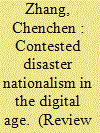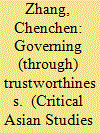|
|
|
Sort Order |
|
|
|
Items / Page
|
|
|
|
|
|
|
| Srl | Item |
| 1 |
ID:
183709


|
|
|
|
|
| Summary/Abstract |
This article examines how affective narratives of the COVID-19 pandemic on Chinese social media reinforce and challenge established scripts of national identity, political legitimacy, and international geopolitical imaginary. Taking theoretical insights from the scholarship on trauma, disaster nationalism, and politics of emotions, I structure the analysis of social media posts from state media and private accounts around three emotional registers: grief as a crucial site of control and contestation during the initial stage of the outbreak; gandong (being moved in a positive way) associated with stories of heroic sacrifices, national unity, and mundane ‘heart-warming’ moments; and enmity in narratives of power struggles and ideological competition between China and ‘the West’, especially the United States. While state media has sought to transform the crisis into resources for strengthening national belonging and regime legitimacy through a digital reworking of the long-standing repertoire of disaster nationalism, alternative articulations of grief, rage, and vernacular memory that refuse to be incorporated into the ‘correct collective memory’ of a nationalised tragedy have persisted in digital space. Furthermore, the article explicates the ways in which popular narratives affectively reinscribe dominant ideas about the (inter)national community: such as the historical imagination of a continuous nationhood rising from disasters and humiliation, positive energy, and a dichotomous view of the international order characterised by Western hegemony and Chinese victimhood. The geopolitical narratives of the pandemic build on and exacerbate binary oppositions between China and ‘the West’ in the global imaginary, which are co-constructed through discursive practices on both sides in mutually reinforcing ways. The lens of emotion allows us to attend to the resonances and dissonances between official and popular narrativisations of the disaster without assuming a one-way determinate relationship between the two.
|
|
|
|
|
|
|
|
|
|
|
|
|
|
|
|
| 2 |
ID:
175479


|
|
|
|
|
| Summary/Abstract |
This article examines the technologies of power and subjectification in China’s social credit system through a theoretically informed analysis of policy and legal documents as well as the narratives of social credit practitioners, including local officials and representatives of business partners. The ongoing project is a heterogeneous ensemble of discourses, regulations, policies, and any number of programs aiming to govern social and economic activities through problematizing, assessing, and utilizing the “trustworthiness” of individuals, enterprises, organizations, and government agencies. Drawing on governmentality studies, the article explicates the operation of governmental and disciplinary-pastoral modalities of power in the project, which are interrelated in their logics and overlap in the tactics employed. Whereas the strategy of governmental/biopolitical power is centered on achieving effective economic governance and improving regulatory compliance through technological fixes, disciplinary-pastoral power aspires to shape individual behavior and the collective mores of a locality according to a mixture of market-oriented and socialist-traditional values. Social credit is envisioned to produce and channel homo economicus and homo moralis. However, the relationships between liberal and socialist subjectivities and between rationalization and moralization are by no means coherent. The assemblage of social credit government is characterized by contradictions and contestations.
|
|
|
|
|
|
|
|
|
|
|
|
|
|
|
|
| 3 |
ID:
167145


|
|
|
|
|
| Summary/Abstract |
This article investigates the making and contestation of mobile borders around the Channel Tunnel, the fixed link connecting Britain and the European continent. It suggests that the bordering of the infrastructural and vehicular spaces is both an object of inquiry in its own right and a productive lens for reflecting on questions related to European Union (EU) territory, the heterogeneous nature of borders as well as the interplay between regimes of control and resistance. The article starts by reviewing the legal and institutional frameworks in which the Channel Tunnel area is governed and envisioned as an interstate and European/Schengen borderzone. It then examines the uncoordinated efforts of national, private and European authorities in managing the episodic migration controversies around this area, which bring together the interconnected rationales of security, economy and humanitarianism and expose the dissonance between and within them. Finally, the article considers how the acts of turbulent mobilities interact with this contingent assemblage of mobility governance and realise the radical potential of territorial borders.
|
|
|
|
|
|
|
|
|
|
|
|
|
|
|
|
|
|
|
|
|